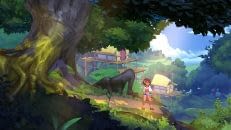“There Are Plenty Of Unfilled Niches Out There” – Ido Yehieli Talks Indie Appeal
[We sat down with developer Ido Yehieli, creator of the tactical dungeon crawler Cardinal Quest (our review here), and had a little chin-wag about such topics as the gaming generation gap (or lack thereof), price perception, indie visibility in the digital age and the things that one likes about Roguelikes]
IGM: Thanks so much for taking the time to speak to us, it’s always a pleasure to hear directly from a developer! Just to get us started, could you tell our readers a little bit about yourself and what you’re currently working on?
Ido: Sure. I’m an indie game developer currently living in Vienna. I am making 100% of my modest living off of my games. I have been working as a professional programmer for 10 years now and on March 1st 2011 I quit my job at a small local game development studio to start making Cardinal Quest, which was released on August 11th for Windows, Mac and Linux. It will soon be released for iOS and Android too.
I have also been working on a new strategy game called Auro: The Golden Prince with the two guys from Dinofarm Games. You can read a bit more on what Auro is all about here. Development for Auro is mainly focused on Android and iOS but it will also be out for Windows, Mac and Linux. It’s currently in alpha testing and hopefully 1.0 will be released some time in the Spring. Also, at the same time my partner Ruari O’Sullivan is working on Cardinal Quest 2.
IGM: You come from a pretty strong programing background; do you find it difficult to juggle that with being a gameplay designer too?
Ido: It’s a challenge. I actually started programming only because I had to program in order to make my games, so the game design is actually the interesting part for me. I am hoping to focus on it more in the future, and optimize my design to not require a ton of programming work.
IGM: Would you drop the programing side of things entirely if you could?
Ido: No, I would actually drop the business and marketing part if I could though, or at least the administrative/bookkeeping part. It’s important to me to be as involved as I can in as many ways as possible. My “dream team” would actually be only me and 1-2 other people and ideally we would all have at least a bit to do in all aspects of game making. Even though in that case it is important to have one person in charge of any single discipline, e.g. one main designer, one main programmer, one main graphics artist; basically one person with a strong vision that has the final say in his particular department (you could have one person be the “head” of more than one discipline, but the important part is that it’s not design-by-committee).
IGM: Dungeon crawlers would look to be your go-to genre. Is there anything specific about that style of game that really appeals to you?
Ido: What appeals to me is a set of characteristics that just happens to be embraced by roguelikes. What I like to focus on are the challenging games that are not challenging because they depend on your reflexes (e.g. Super Meat Boy), and by that I mean turn based and hard. In Roguelikes, you can get away with making the game hard because it’s randomly generated, so playing the first few levels over and over again doesn’t become boring.
For example, a randomized Advanced Wars or Fire Emblem type game would also interest me, I just happened to start with Roguelikes. In fact, I really want to make a turn-based tactics game and will probably go in that direction in 2012. I love Advanced Wars and X-Com, but the current cream of the crop of that genre are so flawed that I think it’s very possible for an indie like me to still make a turn-based tactics game today that’s better than anything else out there
IGM: A significant amount of the difficulty of Roguelikes traditionally comes from their complexity; they often go WAY overboard with tons of RPG mechanics. But Cardinal Quest and, by the looks of it, your current project with Dinofarm cut off the fat and take it down to the basics. Is there an element of genre commentary going on there?
Ido: I think that if you look at Rogue, you will find it a lot more similar to those than it is to Angband, ADOM or ToME4. For me “RPG elements” have nothing to do with why I enjoy Roguelikes and in fact they tend to get in the way. I would have probably even removed leveling up in Cardinal Quest today. The games I like in the genre are a lot more focused on solving hard problems with the hand you were dealt, e.g. Brogue or Crawl, which have a lot of complexity but don’t focus on the RPG elements at all for it, instead they focus on having the players make hard decisions. Desktop Dungeons, Spelunky and Borgue are much bigger inspiration for me than any RPG out there.
IGM: For me at least, part of the appeal Roguelikes is a sense of nostalgia for PC games (such as Rogue itself) that I played when I growing up and I know I’m far from alone in that respect. Do you reckon future generations will still be able to embrace Roguelikes even without the nostalgia factor?
Ido: They already are! There are many teenagers playing Cardinal Quest. I think it’s mainly about making sensible game design choices, as for young people “retro”/8-bit is just a visual style. Look at the games my nephews (aged 13) play: their favorite game is Minecraft and they play a lot of 2D games too (I think Terraria is another favorite, but there’s plenty of others). Also, they play a lot of games on flash portals and iOS which tend to be more like older games in terms of visuals, so it’s not really foreign to them. They also have a PS3 and a modern PC that they play new AAA games on, but it’s hardly the only type of games they play.
I recently read a post by Jeff Vogel where he was saying how indies can go back to forgotten games and genres, ones that have been dropped by the AAA industry since they might not appeal to the lowest common denominator like the latest flashy FPS or MMORPG would. It’s because these games have plenty of fun in them and there are plenty of unfilled niches out there with players that just don’t have much choice these days. The big guys are not interested in selling to the niche that still enjoys stuff like turn-based strategic war games and I am sure a lot of these players aren’t just old fogies clamoring for the golden ages.
But new players are seeing these games for the first time and enjoying them for what they are; it’s because the stuff that made them good back then is still there. Another example is Tim Schafer’s new kickstarter campaign, which had $1,272,964 pledged in about 1 day for an adventure game that no AAA publisher will ever dream of funding. Publishers don’t care about a game that takes $400k to make and will bring back 2x as much in profits, they want to fund games that cost $50m and bring back $500m. But that doesn’t necessarily mean it’s not a good place to be at as a self funded indie.
IGM: Yeah, it’s great to see that kind of enthusiasm around! It’s funny you mentioned Advanced Wars earlier too. I thought a lot about that game when I was playing Cardinal Quest, and about how long it’s been since there was a game that gave me that kind of experience. Do you think stuff like Firaxis’s take on X-Com will help revitalise those experiences too? Or will being on a publisher’s leash always compromise that?
Ido: I think they might really come up with something interesting, but at the moment I remain cautiously optimistic. The thing is, those games to a large extent do not appeal to the “core market” and by adapting them to it, I am afraid it might take out some of the edge that the genre has (e.g. difficulty, and being able to lose). But we will see.
I think it’s not a factor of publishers directly as much as it is having a budget in the tens of millions (or sometimes even more). That means you really do have to sell millions of copies to make up for it and you don’t generally sell millions of copies to a niche. For that, you need to appeal to the most common players who are, for the most part, people who would rather watch TV than play games. I think it is part of the reasons why there are pretty much no challenging single player games anymore, at least among mainstream games; everybody has to be able to win, everyone should be able to see all the content. These games are not about gameplay the way Chess or Go are, they are about consuming content.
IGM: I remember you experimented with a lot of different ways of promoting Cardinal Quest. There was a pay-what-you-want event, a free download day and you even offered extra copies to people who called out publishers over their dodgy DRM (which I though was hilarious by the way). Do you think those promotions had a big impact on overall popularity of Cardinal Quest?
Ido: They had some impact for sure because I noticed sale spikes after them. But it wasn’t that huge of an impact, at least not directly. It got me more visibility though, which was the best part.
IGM: You’ve talked in the past about how hard it is for indies to get that “visibility” when the mainstream media is latching onto the top 1% “super indies” (e.g Phil Fish or Johnathan Blow) while leaving the other 99% out in the cold. Should the 99% be fighting for more attention, or is the onus on the media itself to spread its net a bit wider?
Ido: I think both – we are all fighting to get more visibility and some developers that “have it made” certainly make an effort to draw people’s attention to other less known developers. I think a big part of the problem also has to do with journalists that just fill up the “indie spot” with Minecraft or World of Goo instead of trying to really search out more obscure titles, simply because that’s the easy way out. The developers themselves should also continue to claw their way up there, but right now it’s more like trying to become a part of the few that share the spotlight rather than trying to make the greater public become more aware of anything beyond the top 5 games of the year (if even that).
IGM: Do you think digital distributors (e.g Steam and Desura) need to play more of a hand in raising indie visibility?
Ido: I think you actually see quite a lot of indie games on those, at least if you are interested in indie games to begin with. Of course they advertise the biggest games more, but I don’t think the situation is so terrible, at least not from what I’ve experienced.
IGM: I only ask because I was really intrigued by your article on Dinofarm’s blog about how “Bundles and Steam Sales Aren’t Good for Most Indies”.
Ido: I think a lot of people got a much more extreme notion from that article than what I actually wrote. I think Steam and the Humble Bundle are great. However, among all the good stuff about them there are also some downsides and I was trying to bring up those downsides because I see most people ignoring them. Namely that they lower people’s expectation of how much an indie game is worth.
In the App Store I think it is even more extreme. In fact, I think the iOS and Android stores are a lot worse than Steam, with stuff like the horrible and nonsensical categories. It’s almost impossible to find good games on it even though they exist. Apple and Google really need a curator that knows something about games to fix up the issues of searching and sorting over there and separate the good from the bad. But they don’t care it seems, in fact they seem to actively encourage the race to the bottom. Basically the only way for me to get a good mobile game is to ask a friend for a recommendation.
IGM: Stuff like the iPad not even having searchable game categories (as of writing) certainly seems to back that theory up!
Ido: Have you seen the categories in the android market? “casual” – as if there are non-casual games on it? It’s clearly made by someone who doesn’t know or doesn’t care about games. I think the mobile (and “social”) market is going towards a crash; it will be 1983 all over again. They are just flooded with utter crap and people will learn that you can’t expect anything good over there and will stop playing/buying games on those platforms.
You can read our review of Ido’s Cardinal Quest here. The game is available for purchase on the PC at around £6 from BMT Micro, Gameolith and Desura. You can also play the free ad-supported version over at Kongregate!






